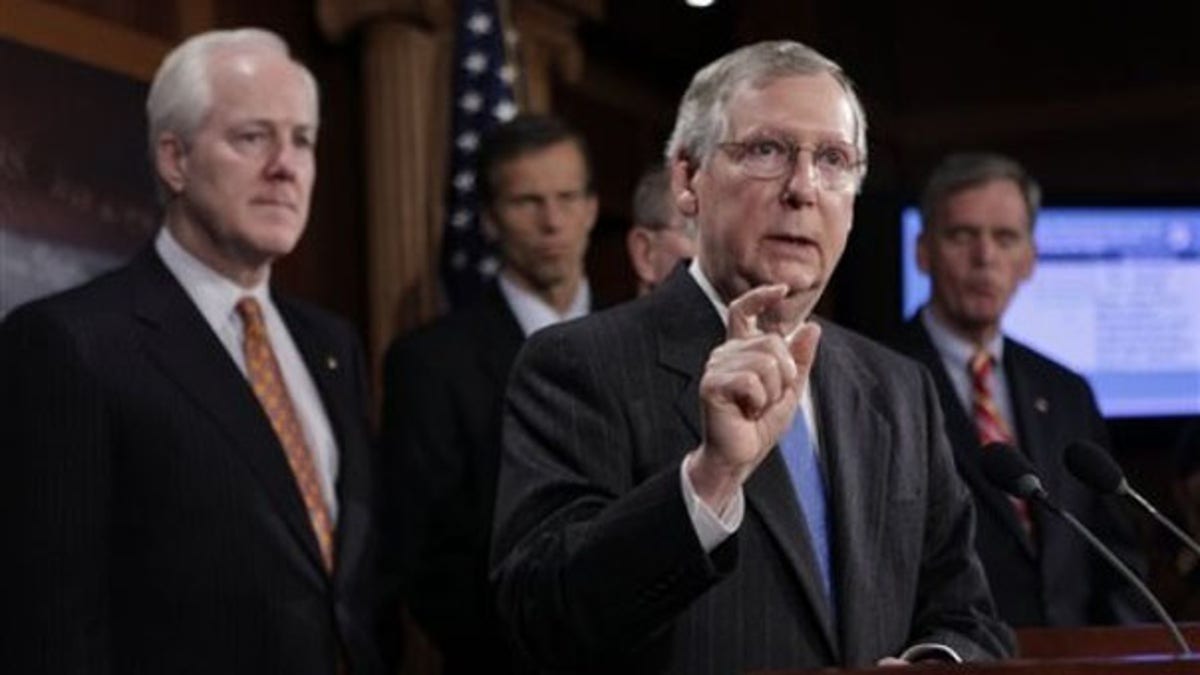
Senate Minority Leader Mitch McConnell gestures during a news conference on Capitol Hill Jan. 20. From left are: Sen. John Cornyn, R-Texas, Sen. John Thune, R-S.D. , McConnell, and Sen. Judd Gregg, R-N.H. (AP Photo)
So the House will vote to approve the health care bill on Sunday, the Senate will promptly polish off a "fix-it" bill, and this whole political nightmare will end -- right?
Not so fast.
Michigan Rep. Bart Stupak, an anti-abortion Democrat, is floating a plan to introduce an entirely separate bill -- in addition to the main Senate bill and the House's package of changes -- to tighten restrictions on abortion funding. This would create a whole new set of votes that have to be cast before Congress can finish its work.
On top of that, Republican senators are warning that they will drag out the process of approving the "sidecar" package of changes that House Democrats want to see passed in exchange for their vote on the main Senate bill. Republicans plan to tinker with that bill so that after they're done with it, the House has to take it up again.
If they succeed, it means the health care issue won't go away Sunday -- or even next week. And Democrats who are looking to get beyond the debate, particularly those in moderate or conservative districts, will be dogged by the issue as they enter the high season of campaigning.
"There's way too much uncertainty," House Minority Whip Eric Cantor, R-Va., told Fox News.
Ideally for Democrats, the House will approve the original Senate bill, approve the "reconciliation" bill and then send that to the Senate, where it will be adopted intact and sent to President Obama's desk. The "reconciliation" bill is the package of changes to the Senate-passed bill that was unveiled Thursday -- under the reconciliation rules, Democrats will be able to pass that bill with just 51 votes in the Senate, instead of 60.
But there are several problems with that plan.
First, Stupak's move to draft a new bill is a considerable complication. He's the moderate Democrat who spearheaded a measure on the original House bill to create a virtual wall between taxpayer dollars and abortion coverage. The Senate bill is seen to be weaker on that front, and Stupak and his allies have pledged to oppose the bill unless they see changes.
If he can pass a bill of "corrections" to the abortion language out of the House, that would have to pass the Senate and then be signed into law by the president before the Senate can take up the package of changes.
Then there are problems with the reconciliation bill itself.
"People who are relying on the reconciliation bill in the House of Representatives ... may well be being sold a bill of goods," Sen. Judd Gregg, R-N.H., said on the floor Thursday.
If the bill is changed at all in the Senate, the House has to take another stab at it. And then if the House changes it, then the Senate has to take it up again. And so on.
Republicans see this as likely.
"It would in any case have to go back to the House of Representatives," said Sen. John Thune, R-S.D.
The prospect of a prolonged health care debate surely doesn't sit well with many Democrats, even though Obama reportedly is telling them the vote is good for their political survival.
The Republicans' specific strategy for prolonging the debate is to exploit a potential problem with the reconciliation bill.
The main trouble spot is that the package includes a change to the controversial tax on high-cost "Cadillac" insurance plans -- under a compromise, because liberal Democrats and unions despise it, the tax would be put off until 2018, as opposed to 2013.
But Republicans argue that the adjustment would run afoul of a congressional rule that says reconciliation cannot be used to tweak Social Security. Because the tax on "Cadillac" insurance plans is projected to bring in revenue to Social Security, any change to that tax would presumably affect Social Security.
This is a clear violation of the rule, GOP sources told Fox News.
It takes 60 votes to waive any objections Republicans might bring up on the floor on those grounds, but Democrats have only 59. And there aren't a lot of senators crossing aisles these days.
Even Democratic North Dakota Sen. Kent Conrad, in an interview with Fox News, conceded that changes are likely. But his strategy is to fix the bill on the House side before it gets to the Senate to minimize the chances of it getting sent back.
The GOP strategy appears to be two-fold, though: Either toy with the bill when it gets to the Senate and drag out the process, or prevent the bill from coming to the Senate at all.
If Republicans can make the case that key parts of the "sidecar" bill will never be passed, then they hope a number of fence-sitting House Democrats will not want to go on record in support of a Senate bill they see as seriously flawed.
"So if you're a member of the House of Representatives, the best you can hope for is you're going to get a bill back to the House that has a lot of these provisions that you care about knocked out," Thune said, calling the idea that the Senate is going to fix all the problems in the original bill an "incredible leap of faith."
Fox News' Chad Pergram and Trish Turner contributed to this report.




